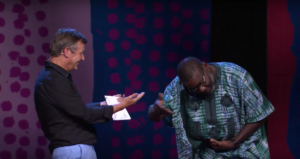Can you hear the clock ticking? While I used the human condition as a metaphor for Nigeria, you know, High Blood Pressure and all that, it was clear in my mind so many decades ago (So quaintly in the ‘20th Century) that we were sitting on a time bomb. Well as we all can see, the fuse has been lit. Tick Tock….Tick…Tock. Enjoy.
People, if you take away their fancy clothes, their arms and legs, and their funny faces are like boilers. An unusual metaphor, which is not to be confused with the endomorphic shapes of certain individuals; this comparison refers more directly to the pressured ‘boiler-like’ human trap that is 20th-century living.
The whole world, it seems, is in the constricting grip of swathes of elastic bandages that tighten with every move and with each passing day. The world is in a straitjacket, but not all of us are mad. And in unravelling this global bandage, it becomes clear that the reasons why there is so much madness in the world are largely the same reason why people cheat, steal or kill—money. Yes, money as an indispensable factor in the dynamics of global geopolitics. Of course, there are other seemingly extraneous but no less inane reasons why at every turn, there is escalating global tension, like the purported dichotomy between the East and the West. As well as the differences in economic and material wealth between the Northern and the Southern hemispheres.
But money, in its most naked form, is largely the propellant of many a man. And in shifting focus from a universal world, to a more particular Nigeria, that aphorism becomes even more apposite.
In Nigeria, there is madness (plenty of it) and there is money (plenty of it also, but in limited hands); the two abound, and very often, localised within the same precincts. Nigerians are propelled even more so, only by the ‘Almighty Naira’. Only with the acquisition of money is it possible to try and insulate the individual (yourself) from the bungling inefficiency of the system.
The system, of course, is currently being represented by a government (of sorts), and I hasten to add that, in these rabidly politicised times, one has to tread very carefully, because the spoken-truth is oftentimes misconstrued and politically distorted.
But it certainly becomes clearer with each passing day that the quality of life in this country is generally on the decline. The machinery of the system has been ill-maintained since Independence and certain powerful Nigerians, in their mad rush for material acquisition and possibly political power are obstructing the free run of its cogs.
The whole machinery is straining and the effects are what all of us are experiencing in its various forms and in varying degrees. A suitable catchphrase is of course ‘Austerity Measures’, but since even that itself is politicised, it is used here very guardedly.
But even that does not detract from the truth; these times are very austere times, and in revisiting our ‘boiler’ metaphor, the pressure is mounting daily. Some of us are lucky to have safety release valves to let off steam periodically, but certainly, most of us simply cannot afford that luxury.
In the anonymity of urban life, the cities become concrete jungles, with real (or imagined) predators lurking behind every street corner. Every day, (especially in the asylum known as Lagos), urbanites are faced with actual life-threatening situations. As a motorist driving regularly on Lagos roads, you are faced with death a couple of times during the course of an ordinary day, oftentimes, through no fault of yours.
As a pedestrian, your lot is even more stressful; since there are almost no sidewalks, your daily perambulations are through an assault course of potholes, mud, rubbish, the occasional dead body, and the unnerving possibility of being run over at any time by anyone of the thousands of madmen (also known as motorists) who motor the streets and non-streets.
Compounding all this is the astronomical cost of living (the highest in the world), the most inefficient public utility services, and possibly the highest crime rate in the country.
In the rural areas, time is frozen in at almost pre-historic setting, with villagers barely existing and consumed by the ennui of humdrum bucolic life. Although, with the general elections around the corner, the so-called ‘grassroots’ will be watered with lots of naira by mendacious campaigning politicians.
However what is certain and common to both the rural and urban areas, is that people’s lives are going down the drain pushed harder and harder, by stress and tension.
High Blood Pressure (H.B.P.), which until a couple of decades ago seemed a solely Western complaint, is now very much a member of the family. And these days, it is not restricted to the stereotypical harried business executive or professional whose job requirements demand a lot of high-calibre decisions. Even the lowly daily labourer is afflicted with this largely urban disease, which is as a direct result of the uncertainties of day-to-day living.
Recently, TIME Magazine (the international American weekly) carried a special report on stress, as it affects the Americans. The report shed a lot of light on the actual nature of stress, and how it affects the psychology and physiology of man.
It also advocated such disparate cures as tranquillisers through self-hypnosis, to transcendental meditation and help from a complex bio-feedback machine; this machine is ultra-sensitive to minute physiological changes in the body, and at the same time, displays such changes on a small screen, so that the subject learns to control voluntarily some of his involuntary actions.
Stress, as defined by Dr Hans Selye, the Austrian-born, founding father of stress research, is, quite simply, the rate of wear and tear in the body; though other stress researchers add the external stimulus that causes such wear and tear.
The external stimulus referred to here covers a broad spectrum of social activities and traumas, and it is the individual’s ability to cope with these problems as they arise that largely determines his frame of mind and his health. We are when confronted with problems, apt to flee or fight, depending on our resources, and our minds.
And this fight-or-flight response is common to the individual; irrespective of whichever society he belongs. And so, the American cracks under such outlandish and sophisticated pressure like whether the Russians will detonate a nuclear bomb over the United States.
And the Nigerian cracks under more earthy and primal pressures like whether he will eat tomorrow. Each coming under tremendous societal pressure, but each as dissimilar as man and woman and each destined to crack up sometime. This society is definitely cracking up; the signs are there already. Just look around you, and ask yourself, is all truly well?
This society is like a huge cauldron filled with a witch’s brew of corruption, tribalism, immorality, and social inequalities, simmering over a fire, fanned by the breath of greedy plutocrats and senseless politicians. Not content with fanning the flames, they have put a tight lid on the cauldron, stifling all meaningful redress.
But pressure is building up under the heat, and one day, that lid will give way, throwing up that very hot witch’s brew. Or, for a more explosive metaphor, we are all sitting on a time bomb, with the timer set and the fuse lit… the detonator waiting. It is now a race, by well-meaning Nigerians to stop the clock. This is no horological figment of the imagination. The bomb is real; and if you would stop for a moment to listen, you will hear the ominous tick-tock.
The Punch,
Saturday, July 2, 1983



